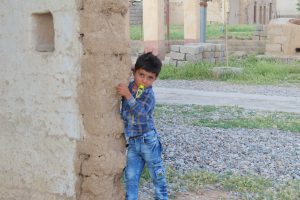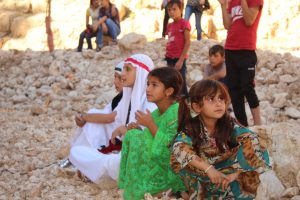This article is part of our series on life for Êzidî (Yazidi) women, written by a member of the Internationalist Commune who is currently working in the women‘s structures in Shengal.
Only the Kurdish movement intervened when the Kurmanci-speaking Êzidî people suffered genocidal massacre at the hands of Daesh in 2014, yet earlier this year the guerillas were forced to withdraw from Shengal. Meanwhile the Êzidîs face continued repression and discrimination from the hostile Iraqi state, who stand by as the fascist Turkish army launches assaults on the Shengal region.
Our comrades in England, Plan C, are currently raising money to tackle the severe health crisis among the Êzidî people in Shengal. See here to learn more about their campaign and the struggle of the Êzidî people, and how you can send financial support.
In the eyes of ISIS, Êzidîs are worse than non-believers. They even call them devil worshippers, and when they conquered the Shengal region uncounted massacres took place – almost 10,000 people killed or captured, according to official sources. Thousands of women and children were captured and sold as slaves.

Small children were often taken into the families of ISIS militants. When freed, many don‘t even know their own name or language or recognize their own family. Since most of ISIS’ so-called Caliphate was freed, many of these families fled, unrecognized by the authorities. Many of these children are now living with “their“ ISIS families, especially in Turkey but also in other countries.
Still today, Êzidî children are returning to their families, facing effective strangers, unknown languages, and many deep traumas. The Internationalist Commune spoke with a mother whose children were and are in the hands of Daesh. Here are her words:
“My name is Naima Hussein, and I am 42 years old. I have eleven children: four are wed, three in the hands of Daesh and four are with me. The oldest is 28, and the youngest is 4.
My children in the hands of Daesh are three girls and a boy – 6-year-old Bese, 7-year-old Suleyman, 8-year-old Cîhan, and 18-year-old Asya.
When the genocide happened I was in the hospital of [Iraqi Kurdistan city] Duhok to give birth to my youngest child Samî. I had left my children with my husband‘s family in Shengal, and when they heard that Daesh had captured Mosul they fled. But in the car on their way to a safe place they were stopped by Daesh. My parents-in-law, my sisters-in-law and my six children were taken to a prison.
My parents-in-law were both shot, like most of the older people. My two sisters-in-law and the children were brought. after a few days of dirty rice and dirty water, to another city and another prison.
There they took the smaller children – Bese, Cîhan, and my two boys Suleyman and Elî, who is now aged 10 – and brought them to another location. After some months, the older girls and the women were brought to Raqqa, where they were sold to different men every day.

Saîma, who is now 16 years old, returned to me after two years. In a moment when she was alone she had the chance to flee and run to a YPG checkpoint, and they brought her back home. She told me that she and Asya had been a long time together in Raqqa, but one day Asya was sold to a man and this time did not return.
My son Elî is now 10 years old. He returned last winter when Raqqa was freed. He lived in a Daesh family. They only spoke Turkish, and it took a long time for him to learn and be able to speak. They forced him to become a Muslim – he had to read the Koran every day and pray with the family.
They told him that all Êzidîs are bad people, monsters, and that he would be killed if he ever returned here. They made him deny being an Êzidî and hate his own society. When he came back home, he was very frightened that he would get killed. He still believed everything those Daesh people had told him.
We still have many problems. When he gets angry or sad, he says very bad things about us. They brainwashed him, and he can‘t really remember his life before the genocide.
Most likely, the same happened to my other young children. But I have no more information about where they are.
I hope they will return, that they will come home safely and we will live together as family again. But I am also afraid of what has happened to my other children, and how they might be today.
Saîma still cries in her sleep every night, and is often afraid of men she doesn‘t know. Sometimes, when she sees the Arabic soldiers of [Iraqi government-backed militia] Heshd-el-Shabî or the government forces, she gets hysterical and starts to scream.
I am disappointed because all the Western and European states talk about human rights and aid, but in reality no one came to help us. Only our own structures, YBŞ/YJŞ (Sinjar Resistance Units/Sinjar Women‘s Units), and the friends of the local parliament are here for us.
Before the ferman (extermination) our life was really good. We had a house, my man had a good work, we had a car and we had no problems. Today everything is destroyed, our house, the whole region and our family itself. I want a future for my children, a future in freedom and peace.